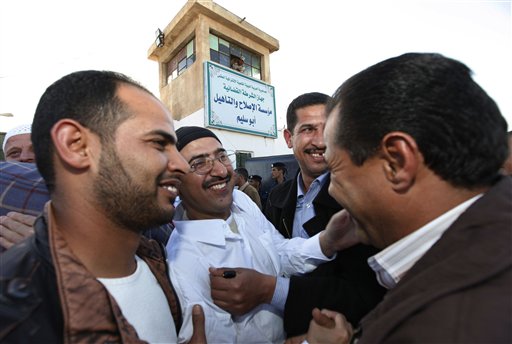Arab anti-government protests spread to Libya
Thursday, February 17, 2011
 A Libyan Islamic prisoner, second left, is hugged by his relatives after he was released with a group of 110 prisoners from Abu Salim, Libya's most notorious prison, in Tripoli, Libya, Wednesday, Feb. 16, 2011. Hundreds of Libyans calling for the government's ouster clashed with security forces firing rubber bullets and water cannons early Wednesday in the country's second-largest city as Egypt-inspired unrest spread to the country long ruled by Moammar Gadhafi. Arabic read" Abu Salim prison". (AP Photo/ Abdel Magid Al Fergany)
A Libyan Islamic prisoner, second left, is hugged by his relatives after he was released with a group of 110 prisoners from Abu Salim, Libya's most notorious prison, in Tripoli, Libya, Wednesday, Feb. 16, 2011. Hundreds of Libyans calling for the government's ouster clashed with security forces firing rubber bullets and water cannons early Wednesday in the country's second-largest city as Egypt-inspired unrest spread to the country long ruled by Moammar Gadhafi. Arabic read" Abu Salim prison". (AP Photo/ Abdel Magid Al Fergany)Protests convulsed half a dozen countries across the Middle East on Wednesday, with tens of thousands of people turning out in Bahrain to challenge the monarchy, a sixth day of running street battles in Yemen, continued strikes over long-suppressed grievances in Egypt and a demonstrator's funeral in Iran turning into a brief tug of war between the government and its opponents.
Even in heavily policed Libya, pockets of dissent emerged in the main square of Benghazi, with people calling for an end to the 41-year rule of Moammar Gadhafi. Iraq, accustomed to sectarian conflict, got a dose of something new: a fiery protest in the eastern city of Kut over unemployment, sporadic electricity and government corruption.
From northern Africa to the Persian Gulf, governments appeared to flounder on just how to outrun mostly peaceful movements, spreading erratically like lava erupting from a volcano, with no predictable end. The unrest has been inspired partly by grievances unique to each country, but many shared a new confidence, bred in Egypt and Tunisia, that a new generation could challenge unresponsive authoritarian rule in ways their parents thought impossible.
While the police initially withdrew from the main streets of Manama, the capital of the Persian Gulf island nation of Bahrain, officers used tear gas and percussion grenades early this morning to try to empty a central square of protesters. In Libya, Iran and Iraq, riot officers also confronted the demonstrators -- three of whom were killed in Kut when security forces opened fire.
Leaders fell back on habitual, ineffective formulas. A ban on strikes announced by the week-old military government in Egypt was ignored. The Yemeni president, Ali Abdullah Saleh, called his Bahraini counterpart, King Hamad bin Isa al-Khalifa, to commiserate about the region falling victim to "foreign agendas," according to the state-run SABA news agency.
"There are schemes aimed at plunging the region into chaos and violence targeting the nation's security and the stability of its countries," the news agency quoted Saleh as telling the king.
The continued eruptions present a particular challenge to the United States. It is caught between broadly supporting democracy in the region and tolerating the stability guaranteed by despots, analysts said. In addition, its ability to influence events is limited particularly with foes like Iran.
President Barack Obama's administration was accused of waffling on Egypt, trying to please the protesters while not really pushing President Hosni Mubarak, a longtime ally of the United States, to leave. It faces a similar dilemma in Bahrain, a crucial base for the Navy's 5th Fleet.
